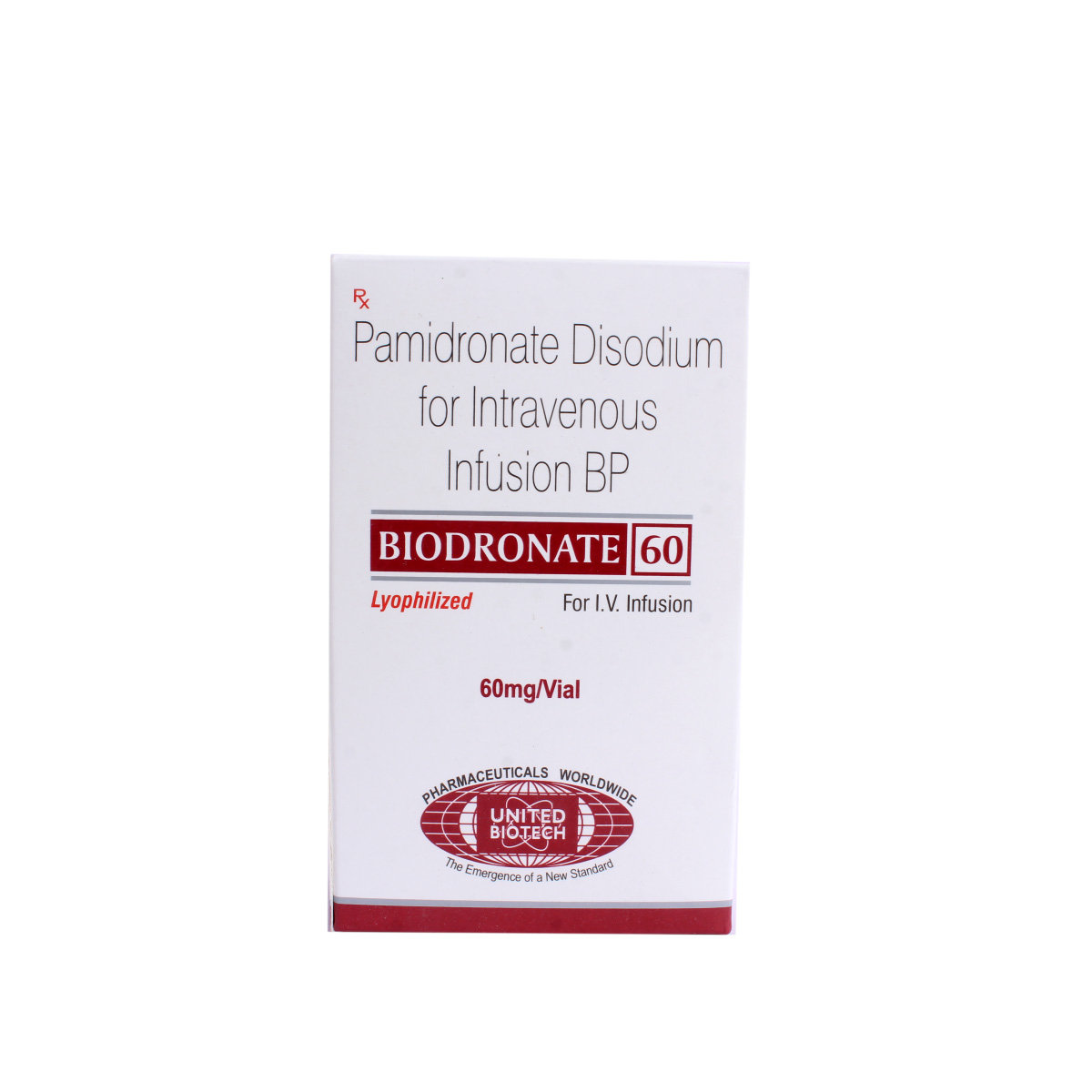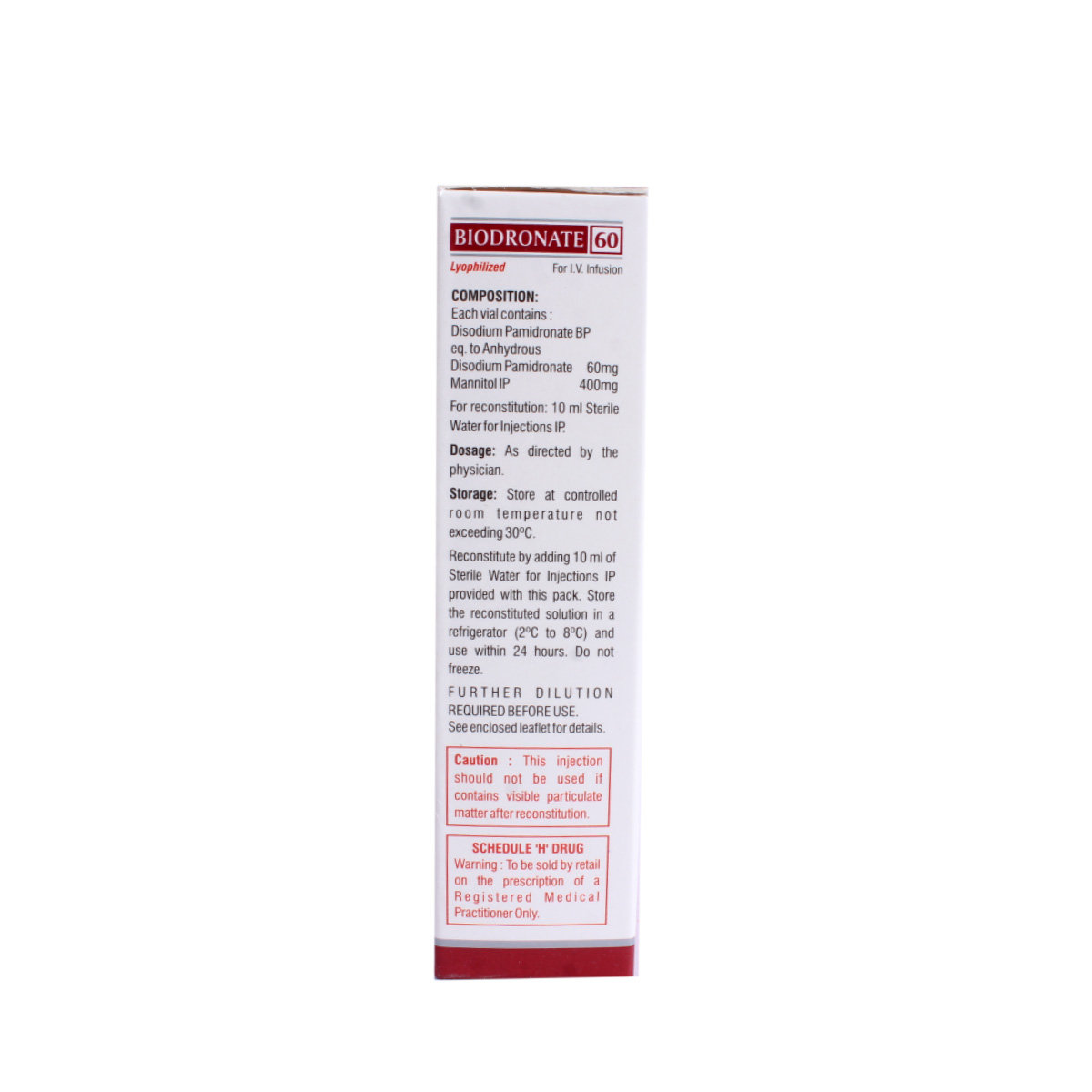Biodronate 60 mg Injection 1's
MRP ₹3386
(Inclusive of all Taxes)
₹406.3 Cashback (12%)
Provide Delivery Location
Online payment accepted
 Prescription drug
Prescription drugWhats That
Composition :
Manufacturer/Marketer :
Consume Type :
Expires on or after :
Return Policy :
About Biodronate 60 mg Injection
Biodronate 60 mg Injection is a hypocalcemic agent that belongs to the bisphosphonates class. It is mainly used in lowering blood calcium levels and bone metastases/lesions in cancer patients. Besides this, it is also used to treat mild to moderate Paget's disease. Hypercalcemia (increased calcium levels) is a condition in which the calcium level in your blood is elevated due to certain conditions. Paget’s disease is a serious condition of bone that disrupts the replacement of old bone tissue with new bone tissue, resulting in the new bone that is abnormally shaped, weak, and brittle.
Biodronate 60 mg Injection contains Pamidronate as an active ingredient, which belongs to the class of bisphosphonates. It works by inhibiting the osteoclast bone resorption, which causes bone breakdown. When bone is broken down, the calcium in the bone is released into the bloodstream. Thus, it helps retain the normal density of bones and restores bone integrity, bone strength and bone health.
Biodronate 60 mg Injection may cause certain side effects such as injection site reactions, stomach pain, loss of appetite, nausea, vomiting, fever, headache, dizziness, mouth sores, constipation, and cough. Most of these side effects do not require medical attention and gradually resolve over time. However, if these side effects persist for a longer period, please consult your doctor. Biodronate 60 mg Injection is a parenteral preparation. A trained healthcare professional will administer it. Hence, do not self-administer.
Biodronate 60 mg Injection should be avoided if you are allergic to it or any other components present in it. Before receiving Biodronate 60 mg Injection, let your doctor know about all your medical conditions, sensitivities, and medications you are using to rule out any interactions. Biodronate 60 mg Injection should be used under caution if you have/had kidney disease, liver problems, bone disorders, musculoskeletal pain, and high blood pressure. Biodronate 60 mg Injection is not recommended for use in pregnant women due to foetal harm, and whether this medicine can be used for breastfeeding mothers is unknown. Hence, inform your doctor if you are pregnant or are breastfeeding before receiving Biodronate 60 mg Injection. This medicine is not recommended for use in children as safety and efficacy have not been established.
Uses of Biodronate 60 mg Injection
Directions for Use
Key Benefits
Biodronate 60 mg Injection contains Pamidronate as an active ingredient, which belongs to the class of bisphosphonates. It works by inhibiting the osteoclast bone resorption, which causes bone breakdown. When bone is broken down, the calcium in the bone is released into the bloodstream. Thus, it helps retain the normal density of bones and restores bone integrity, strength, and health.
Storage
- Inform your doctor immediately if you experience a fever after starting a new medication.
- Your doctor may adjust your medication regimen or dosage as needed to minimize fever symptoms.
- Monitor your body temperature to monitor fever progression.
- Drink plenty of fluids, such as water or electrolyte-rich beverages, to help your body regulate temperature.
- Get plenty of rest and engage in relaxation techniques, such as deep breathing or meditation, to help manage fever symptoms.
- Under the guidance of your doctor, consider taking medication, such as acetaminophen or ibuprofen, to help reduce fever.
- If your fever is extremely high (over 103°F), or if you experience severe symptoms such as confusion, seizures, or difficulty breathing, seek immediate medical attention.
Drug Warnings
Biodronate 60 mg Injection should be avoided if you are allergic to it or any other components present in it. Before receiving Biodronate 60 mg Injection, let your doctor know about all your medical conditions, sensitivities, and medication history you are using to rule out any interactions. Biodronate 60 mg Injection should be used under caution if you have/had kidney disease, liver problems, bone disorders, musculoskeletal pain, and high blood pressure. Biodronate 60 mg Injection is not recommended for use in pregnant women due to foetal harm, and whether this medicine can be used for breastfeeding mothers is unknown. Hence, inform your doctor if you are pregnant or are breastfeeding before receiving Biodronate 60 mg Injection. This medicine is not recommended for use in children as safety and efficacy have not been established.
Drug-Drug Interactions
Drug-Drug Interactions
Login/Sign Up
Taking Human immunoglobulin with Biodronate 60 mg Injection, may raise the risk of kidney problems.
How to manage the interaction:
Co-administration of Human immunoglobulin with Biodronate 60 mg Injection can result in an interaction, but it can be taken if a doctor has advised it. However, if you experience nausea, vomiting, loss of appetite, increased or decreased urination, sudden weight gain or loss, fluid retention, swelling, shortness of breath, muscle cramps, tiredness, weakness, dizziness, confusion, or an irregular heart rhythm, consult a doctor. Do not discontinue any medications without consulting a doctor.
Drug-Food Interactions
Drug-Food Interactions
Login/Sign Up
Diet & Lifestyle Advise
- Try to consume calcium and vitamin D in their diet as it helps make stronger bones and avoid everyday osteoporosis dangers.
- Regular exercise like weight-bearing exercises are important for maintaining bone health.
- Calcium is important for making bones strong. Vitamin D is equally important, which helps ensure calcium absorption and retention in bones, so take food high in calcium and vitamins.
Side Effects of Biodronate 60 mg Injection
- Injection site reactions
- Nausea
- Vomiting
- Dizziness
- Constipation
- Stomach pain
- Loss of appetite
- Headache
- Cough
- Fever
- Mouth sores
Habit Forming
Therapeutic Class
All Substitutes & Brand Comparisons
RX
Out of StockPamidria 60mg Injection
Cipla Ltd
₹3264.13
(₹267.66/ 1ml)
91% CHEAPER
Author Details
We provide you with authentic, trustworthy and relevant information
Drug-Diseases Interactions
Drug-Diseases Interactions
Login/Sign Up
FAQs
Drug-Drug Interactions Checker List
- THALIDOMIDE
- FUROSEMIDE
- TORSEMIDE
- GENTAMICIN
- NEOMYCIN
- LITHIUM
Special Advise
- Your doctor may suggest certain blood tests, like serum calcium, CBC, and kidney function tests, to check for any unpleasant effects.
- Bone density scans are used to check bone mineral density (BMD).
- Clinical monitoring of serum electrolyte concentrations may also be advised.
Disease/Condition Glossary
Hypercalcemia: Hypercalcemia is when the calcium level in the blood is higher than normal. Too much calcium in the blood can weaken the bones, create kidney stones, and interfere with working the heart and brain. It is usually a result of overactive parathyroid glands. Symptoms include increased thirst and urination, stomach pain, nausea, bone pain, muscle weakness, confusion and fatigue.
Paget's disease: Paget's disease is a chronic disease of bone that disrupts the replacement of old bone tissue with new bone tissue, resulting in the new bone that is abnormally shaped, weak and brittle. It most commonly occurs in the pelvis, skull, spine, and legs. Symptoms include bone pain, joint pain (especially in the back, hips, and knees), headache, enlargement and bowing of the thighs (femurs) and lower legs (tibias), and enlargement of the skull in the area of the forehead.

Have a query?
Alcohol
Safe if prescribed
Consuming alcohol while on treatment with Biodronate 60 mg Injection is not recommended as it may result in unpleasant side effects or make you more susceptible to the effects of alcohol.
Pregnancy
Consult your doctor
It is not recommended for use in pregnancy as it may harm your foetus. Hence, if you are pregnant or planning pregnancy, inform your doctor before receiving Biodronate 60 mg Injection. Your doctor may prescribe this medicine if the benefits outweigh the risks.
Breast Feeding
Consult your doctor
If you are breastfeeding, inform your doctor before receiving Biodronate 60 mg Injection. Your doctor may prescribe this medicine if the benefits outweigh the risks.
Driving
Safe if prescribed
Biodronate 60 mg Injection will be administered in the hospital setting. Hence, avoid driving vehicles.
Liver
Consult your doctor
If you have a pre-existing or a history of liver disease, inform your doctor before receiving Biodronate 60 mg Injection. Your doctor may adjust the dose of this medicine or prescribe a suitable alternative based on your condition.
Kidney
Consult your doctor
If you have a pre-existing or a history of kidney disease, inform your doctor before receiving Biodronate 60 mg Injection. Your doctor may adjust the dose of this medicine or prescribe a suitable alternative based on your condition.
Children
Safe if prescribed
Biodronate 60 mg Injection is not recommended for children as the safety and effectiveness have not been established.










.jpg?tr=q-85)

